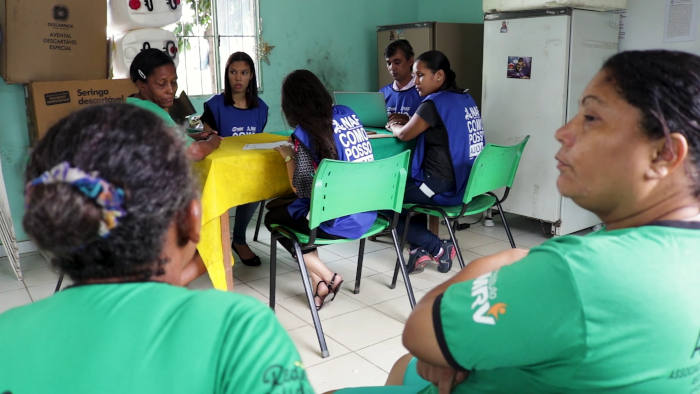-
18 July 2019
Category : Opinion
Breaking barriers: how to bring taxation closer to the most vulnerable groups in Latin America
Borja Díaz Rivillas, technician from the EUROsociAL+ programme, recounts the experience of Sergio Dos Santos, one of the coordinators of an accounting and tax support core (NAF).
 Members of the UNIVALE NAF advising the ASCANAVI association
Members of the UNIVALE NAF advising the ASCANAVI associationSergio Dos Santos Reis worked during his childhood and youth as a street vendor selling ice cream and washing cars in the suburbs of the city of Gobernador Valadares, in the Brazilian state of Minas Gerais. He knows very well what it is to live in an environment with few opportunities to prosper.
“Education changed the story of my life,” says Sergio. After completing a bachelor’s degree and a master’s degree, he is now a professor of accounting sciences at the University of Vale do Rio Doce (Univale). For four years he has also been the coordinator of the accounting and tax support core ( NAF ) of his university. NAF is a free tax and accounting consultancy service for low-income people that Sergio runs with his students, who are previously trained by the tax administration, the Federal Revenue Service.
NAF is active in the university, but it also runs an itinerant service to help vulnerable members of society, including the community in which Sergio grew up. “They are areas with problems gaining access to microcredit or micro-entrepreneurship, people who do not have access to the internet, low-income people without resources to pay an accounting professional, people who do not have information or knowledge about their rights in relation to their retirement, pension or the procedures involved therein. We are talking about small businesses such as manicure and pedicure salons, hairdressers, steakhouses and cake vendors, among others. NAF helps them,” he explains.
Univale’s NAF also supports itinerant non-profit social organizations , such as Associação dos Catadores Materiais Reciclados ( Ascanavi ), which works in very underprivileged neighbourhoods affected by drugs and prostitution.
“They are people who have sometimes suffered sexual violence, physical violence, who have not had the opportunity to get an education, and who dedicate themselves to garbage collection to survive through recycling. NAF goes to that community to do job orientations, analyses and accounting and tax document support for the association,” Sergio says.
How does NAF transform the lives of these people? “I’ll give an example. One day we talked with a mother who has a child with a disability. For five years she had been unfairly deprived of a benefit to which her son’s situation entitled her. When we solved her problem and we got the tax administration to reimburse her for the amounts they had unfairly withheld, she cried. She told us that she would be able to use that money to pay for medicines, to eat, and to feed her son. The story strongly impacted my life, because we solved something that was very complicated for her and very simple for us.”
But NAF also transforms the lives of the students . “In our line of study we have courses on ethics and citizenship. While working in NAF, the student sees theory put into practice. Students interact with the reality of the country by doing things for others and exercising citizenship . I see the joy in the faces of the students when they see that they can transform peoples’ lives,” says Sergio.
NAF emerged in Brazil in 2011. Today, thanks to the support of EUROsociAL+, through its alliance with the Federal Revenue Service of Brazil, they are already operating in more than 650 higher education institutions in 10 Latin American countries. In this new phase of the EUROsociAL we are pushing for a more social character, promoting help for people in a situation of vulnerability, in areas with high-informality and weak State presence where NAF act as a bridge between the tax administration and citizens, linking realities that are still very distant.
Borja Díaz Rivillas, Senior Expert in Democratic Governance for the EUROsociAL+ Programme
The views and opinions expressed in this blog are the sole responsibility of the person who write them.




